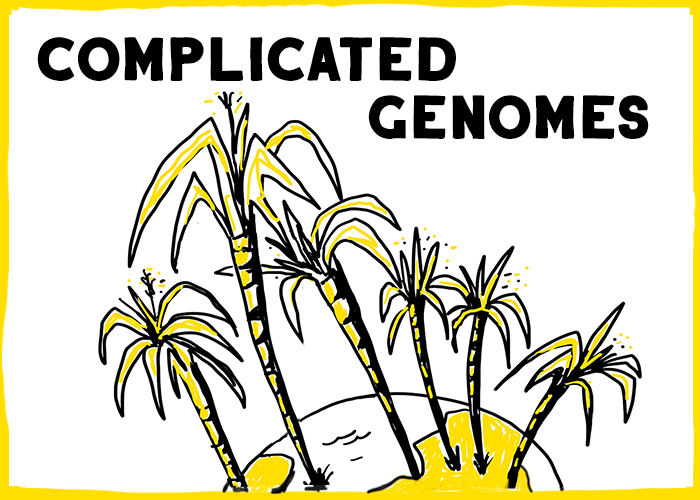
Eucalyptus trees are among the most widely planted hardwood trees and serve myriad purposes. Bioenergy researchers want to harness its potential application toward sustainable biofuels production. (Roy Kaltschmidt, LBNL)
Huntsville, Ala. – An international research team led by Jeremy Schmutz of the HudsonAlpha Institute for Biotechnology announced that it has sequenced the first draft genome of the eucalyptus tree. The team’s findings provide clues into how the ubiquitous trees adapt to new and changing environments and point to a possible new source of energy as well as ways for growers to boost wood production.
The announcement was published online in the June 11, 2014 edition of the journal Nature.
The sequencing and analysis of 640 million base pairs making up the Eucalyptus grandis genome shows how the tree’s unique genetics allows the trees to make wood very quickly, opening the door to using the trees for large-scale biomass energy production. The genome also helped researchers understand the molecular pathways that the trees use to produce oils and chemicals called terpenes, which are used in a number of manufacturing processes. Schmutz and his colleagues used whole-genome shotgun sequencing (a method based on the assembly of many shorter DNA fragments into a genome) to sequence the genome, using similar technology as was used for the human genome, producing a high quality reference genome.
Native to Australia, the eucalyptus is now the world’s most widely planted hardwood tree. Its fast growth makes it a desirable source of timber and pulpwood and the oil derived from its leaves has wide medicinal, perfumery, and industrial uses. Currently, more than 700 species of eucalyptus thrive around the world, and the tree’s 36,000 genes provide an unusually high degree of genetic variation.
It is this extraordinary genetic diversity that may have allowed the eucalyptus to be so successful in so many geographic areas, and could help farmers, energy producers and researchers understand how to harness this genetic diversity into crops that can provide higher yields while resisting drought, pests and other challenges.
“Most of our agricultural production is based on a limited number of crops,” said Schmutz. “For trees that live for years, it takes much longer to develop customized varieties. But for eucalyptus, understanding and manipulating the tree’s already remarkable ability to grow quickly can accelerate the rate of biomass production.”
The researchers found that one genetic key the eucalyptus genome holds is based on a structure called tandem duplicate arrays. These are copies of genes that sit as neighbors on a chromosome, and they ensure that large amounts of a protein or other products of those genes are produced. Typically, there is not much variety in these arrays in plant genomes, but eucalyptus has an unusually high number (about three times that of the common poplar tree) of different varieties of these arrays. Therefore, the tree produces massive quantities of diverse chemicals that fend off a wide range of insects and other pests. These chemicals are used themselves for various products, and can allow the tree to grow large quantities of cellulose, which makes up wood-based biomass.
The researchers also found genes that controlled 18 enzymatic steps to produce cellulose and hemicellulose, cell wall carbohydrates that could be candidate targets for biofuel. Knowing these enzymatic pathways, as well as the source of the tree’s ability to adapt to nearly any surrounding, will underscore future efforts to direct the growth of these trees for energy, agricultural and manufacturing purposes.
Schmutz, who is co-director of the HudsonAlpha Institute’s Genome Sequencing Center, works on genome sequencing projects of plants and fungi. He is also interested in the tailored construction of data collection and analysis systems for genetics experiments. Schumtz leads the plant program in the Joint Genome Institute, a virtual organization funded by the Department of Energy to support initiatives related to clean energy generation.
The HudsonAlpha Genome Sequencing Center focuses on the generation of high-quality plant and fungal genomic resources for the scientific community. The Center specializes in whole genome sequencing, assembly, and analysis of non-bacterial plants and certain animals, together with improvement or finishing of complex genomes. The Center has sequenced the genomes of cotton, switchgrass, marine animals, and algae. The Informatics and Production Sequencing Group, part of the Center, uses computer systems and programs to track, manage, analyze and visualize very large sets of data to better understand the output of biological information by our genes.
Researchers leading the study were from HudsonAlpha Institute, the US Department of Energy’s Joint Genome Institute, University of Pretoria, the Brazilian Agricultural Research Corporation, Catholic University of Brasilia, and the Oak Ridge National Laboratory with the majority of the project funded through the Department of Energy.
Media Contact: Beth Pugh
bpugh@hudsonalpha.org
256-327-0443
About HudsonAlpha: HudsonAlpha Institute for Biotechnology is a nonprofit institute dedicated to innovating in the field of genomic technology and sciences across a spectrum of biological problems. Its mission is three-fold: sparking scientific discoveries that can impact human health and well-being; fostering biotech entrepreneurship; and encouraging the creation of a genomics-literate workforce and society. The HudsonAlpha biotechnology campus consists of 152 acres nestled within Cummings Research Park, the nation’s second largest research park. Designed to be a hothouse of biotech economic development, HudsonAlpha’s state-of-the-art facilities co-locate scientific researchers with entrepreneurs and educators. The relationships formed on the HudsonAlpha campus allow serendipity to yield results in medicine and agriculture. Since opening in 2008, HudsonAlpha, under the leadership of Dr. Richard M. Myers, a key collaborator on the Human Genome Project, has built a name for itself in genetics and genomics research and biotech education, and boasts 26 biotech companies on campus.


